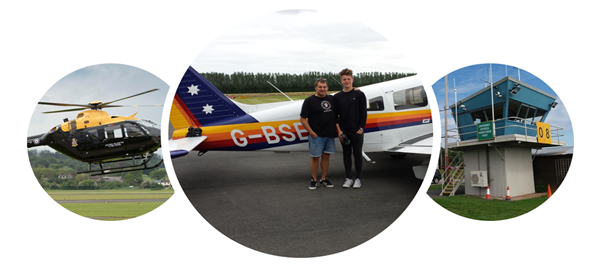My Cranfield MSc: Astronautics and Space Engineering – Pathway to space.
23/02/2021

Where did it all start? How did I become interested in the space sector? I would say that my interest in aerospace originated from my passion for aircraft and helicopters from an early age. I remember I did my high school work experience shadowing an RAF helicopter pilot and was lucky enough to get a few flights with him in the Eurocopter Squirrel HT1 from the Defence Helicopter Flying School out of RAF Shawbury back in 2014.
From then, I developed a real passion towards flying and really wanted to become a fast jet pilot in the RAF. Due to this interest, I took up flying lessons from my local airfield when I was 16 and managed to do my first solo flight before the time I got my driving licence! As I was spending so much time at the airfield, I managed to pick up a part-time job there where I started off as an Air Traffic Service Assistant in the tower.
I continued with this job through college, progressing to an Air Ground Controller after obtaining my Radio Operators Certificate of Competence (ROCC) from the Civil Aviation Authority in 2017 to operate VHF radiotelephony equipment and exchange spoken messages in the aeronautical radio services.
In terms of academia, my strongest subjects were maths and physics, which ultimately lead me to study this combination in college as well, as well as psychology, physical education and an Extended Project Qualification (EPQ) looking into lift generation and aerofoil characteristics. This ultimately then led me to study my BEng in Aerospace Engineering with Pilot Studies down in Bristol.

I only really started to specialise in space flight during my final year, choosing to tailor my elective modules towards spacecraft engineering, which gave me valuable experience in simulation exercises on geometric orbit design, mission and spacecraft systems engineering using the Open Cosmos beeApp simulator as well as analysis of radiation dosage on shielding thickness and spacecraft mean body temperature with the STK Space Environment and Effects Tool.
As my personal interests are within space flight and rocket propulsion systems, this led me to do my final year individual project on an exploration of the design of liquid bi-propellent engines, with a practical investigation into the combustion phase using CFD. For those who don’t know what CFD is, it is Computational Fluid Dynamics, and engineers use it to model fluid flow to simulate real life applications. In my case, this was the chemical reaction of various combinations of fuels and oxidisers and see how they affected the performance of the engine, the specific impulse. I then took this further, and am now studying Astronautics and Space Engineering MSc at Cranfield University.
Categories & Tags:
Leave a comment on this post:
You might also like…
Keren Tuv: My Cranfield experience studying Renewable Energy
Hello, my name is Keren, I am from London, UK, and I am studying Renewable Energy MSc. My journey to discovering Cranfield University began when I first decided to return to academia to pursue ...
3D Metal Manufacturing in space: A look into the future
David Rico Sierra, Research Fellow in Additive Manufacturing, was recently involved in an exciting project to manufacture parts using 3D printers in space. Here he reflects on his time working with Airbus in Toulouse… ...
A Legacy of Courage: From India to Britain, Three Generations Find Their Home
My story begins with my grandfather, who plucked up the courage to travel aboard at the age of 22 and start a new life in the UK. I don’t think he would have thought that ...
Cranfield to JLR: mastering mechatronics for a dream career
My name is Jerin Tom, and in 2023 I graduated from Cranfield with an MSc in Automotive Mechatronics. Originally from India, I've always been fascinated by the world of automobiles. Why Cranfield and the ...
Bringing the vision of advanced air mobility closer to reality
Experts at Cranfield University led by Professor Antonios Tsourdos, Head of the Autonomous and Cyber-Physical Systems Centre, are part of the Air Mobility Ecosystem Consortium (AMEC), which aims to demonstrate the commercial and operational ...
Using grey literature in your research: A short guide
As you research and write your thesis, you might come across, or be looking for, ‘grey literature’. This is quite simply material that is either unpublished, or published but not in a commercial form. Types ...






